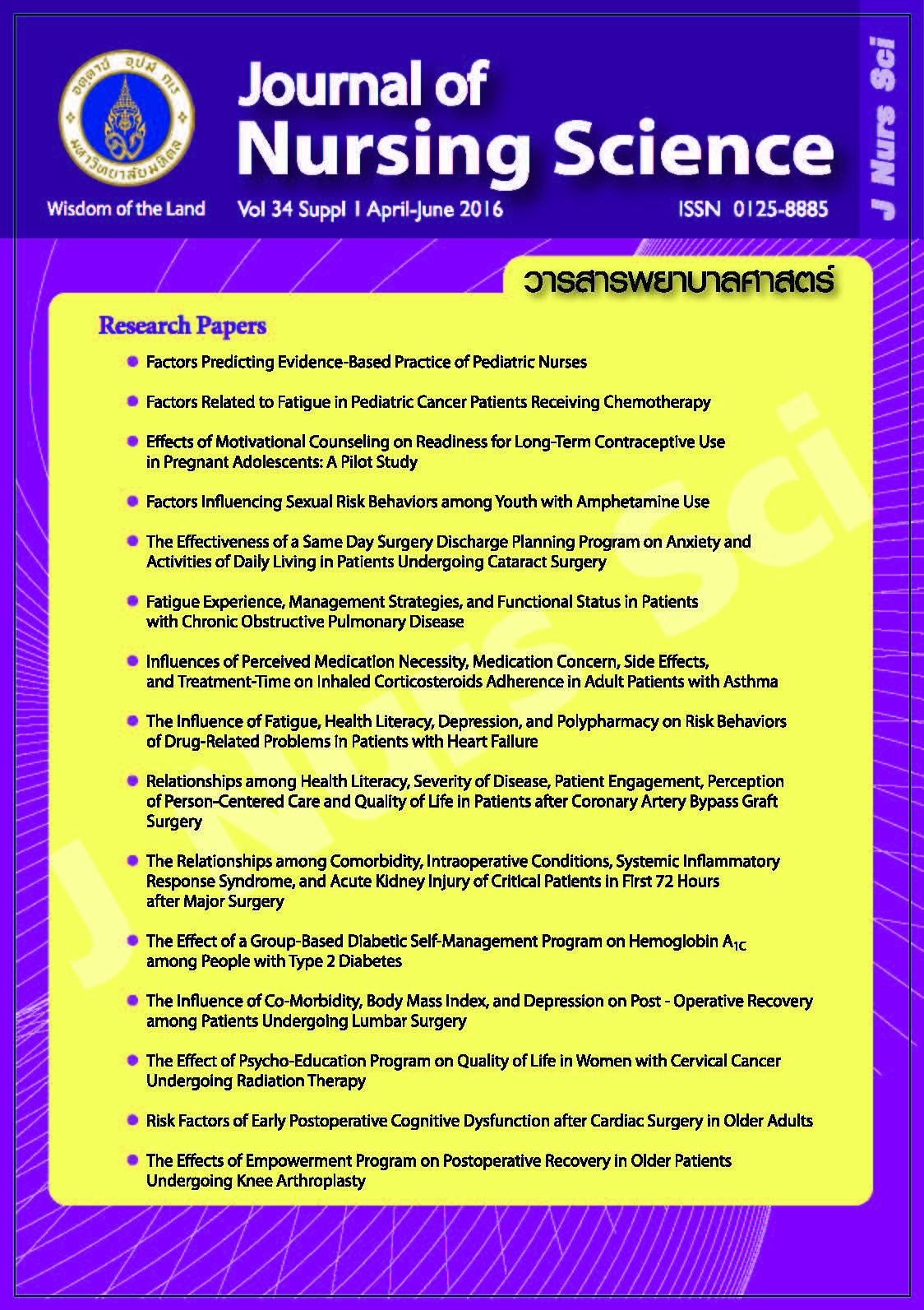The Effect of a Group-Based Diabetic Self-Management Program on Hemoglobin A1C among People with Type 2 Diabetes
Main Article Content
Abstract
Abstract
Purpose: This study aimed to examine the effect of a group-based diabetic self-management program on hemoglobin A1C among people with type 2 diabetes.
Design: Experimental study design.
Methods: The sample composed of 58 participants with type 2 diabetes who were randomly selected and randomly assigned into an experimental or a control group. Twenty eight participants in the experimental group received a group-based diabetic self-management program, and 30 participants in the control group received regular nursing care. Data were collected by self-reported questionnaires and self-recorded diary; and were analyzed using descriptive statistics, and inferential statistics (chi-square, t-test, and analysis of covariance).
Main findings: Results revealed that at the end of the program, the experimental group had statistically significant lower hemoglobin A1C than before receiving the program and lower than those in the control group (p < .05).
Conclusion and recommendations: Knowledge, skills training, nurse support, including telephone coaching, and self-efficacy were the cornerstone of this group-based diabetic selfmanagement program. It fostered people with type 2 diabetes to be able to control the level of hemoglobin A1C. This program could be applied to other similar health care settings.
ผลของโปรแกรมการจัดการเบาหวานด้วยตนเองแบบกลุ่มต่อระดับ
ฮีโมโกลบินเอวันซี ในผู้ป่วยเบาหวานชนิดที่ 2
บทคัดย่อ
วัตถุประสงค์: เพื่อการศึกษาผลของโปรแกรมการจัดการเบาหวานด้วยตนเองแบบกลุ่มต่อระดับฮีโมโกบินเอวันซีในผู้ป่วยเบาหวานชนิดที่ 2
รูปแบบการวิจัย: การวิจัยเชิงทดลอง
วิธีดำเนินการวิจัย: กลุ่มตัวอย่างเป็นผู้ป่วยเบาหวานชนิดที่ 2 จำนวน 58 คน โดยการสุ่มแบบง่ายจากประชากรและสุ่มเลือกเข้ากลุ่มทดลองหรือกลุ่มควบคุม กลุ่มทดลอง จำนวน 28 คนได้รับโปรแกรมการจัดการเบาหวานด้วยตนเองแบบกลุ่มภายใต้แนวคิดการจัดการตนเองและทฤษฎีสมรรถนะแห่งตน และกลุ่มควบคมุ จำนวน 30 คนได้รับการพยาบาลตามปกติ เก็บข้อมูลจากการตอบแบบสอบถามและการจดบันทึกด้วยตัวเอง วิเคราะห์ข้อมูลโดยใช้สถิติพรรณนา และ
สถิติอ้างอิง (ไคสแควร์ การทดสอบที และการวิเคราะห์ความแปรปรวนร่วม)
ผลการวิจัย : กลุ่มทดลองมีระดีบฮีโมโกบินเอวันซีหลังจากเข้าร่วมโปรแกรมต่ำกว่าก่อนเข้าร่วมโปรแกรม และต่ำกว่ากลุ่มควบคุมอย่างมีนัยสำคัญทางสถิติ (p < .05)
สรุป และข้อเสนอแนะ: การให้ความรู้ฝึกทักษะการสนับสนุนของพยาบาล การใช้โทรศัพท์กระตุ้นติดตามและการส่งเสริมสมรรถนะแห่งตน เป็นแกนสำคัญของโปรแกรมการจัดการเบาหวานด้วยตนเองแบบกลุ่ม ช่วยให้ผู้ป่วยเบาหวานควบคุมระดับฮีโมโกลบินเอวันซีได้ดี สามารถนำโปรแกรมไปประยุกต์ใช้ในหน่วยบริการสุขภาพอื่นที่คล้ายคลึงกันได้
คำสำคัญ: โปรแกรมการจัดการเบาหวานด้วยตนเองแบบกลุ่ม ฮีโมโกลบินเอวันซี ผู้ป่วยเบาหวานชนิดที่ 2
Article Details
Copyright Notice: Nursing Science Journal of Thailand has exclusive rights to publish and distribute the manuscript and all contents therein. Without the journal’s permission, the dissemination of the manuscript in another journal or online, and the reproduction of the manuscript for non-educational purpose are prohibited.

Disclaimer: The opinion expressed and figures provided in this journal, NSJT, are the sole responsibility of the authors. The editorial board bears no responsibility in this regard.


